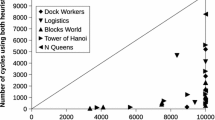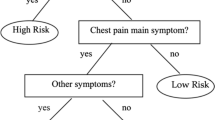Abstract
Though they constitute the major knowledge source in problem-solving systems, no unified theory of heuristics has emerged. Pearl [15] defines heuristics as “criteria, methods, or principles for deciding which among several alternative courses of action promises to be the most effective in order to achieve some goal”. The absence of a more precise definition has impeded our efforts to understand, utilize, and discover heuristics. Another consequence is that problem-solving techniques which rely on heuristic knowledge cannot be relied upon to act rationally — in the sense of the normative theory of rationality.
To provide a sound basis for BPS, the Bayesian Problem-Solver, we have developed a simple formal theory of heuristics, which is general enough to subsume traditional heuristic functions as well as other forms of problem-solving knowledge, and to straddle disparate problem domains. Probabilistic heuristic estimates represent a probabilistic association of sensations with prior experience — specifically, a mapping from observations directly to subjective probabilities which enables the use of theoretically principled mechanisms for coherent inference and decision making during problem-solving. This paper discusses some of the implications of this theory, and describes its successful application in BPS.
Similar content being viewed by others
References
P. Cheeseman, In defense of probability, in:Proc. Int. Joint Conf. on Artificial Intelligence, Los Angeles (1985).
P. Cheeseman and M. Self, Bayesian prediction for Artificial Intelligence, in:Proc. 3rd Workshop on Uncertainty in AI, Seattle (1987).
R. Descartes,Discourse on Method: Optics (1637).
R.O. Duda and P.E. Hart,Pattern Classification and Scene Analysis (Wiley, New York, 1973).
I.J. Good, A five year plan for automatic chess, Machine Intelligence 2 (1968).
I.J. Good,The Estimation of Probabilities (MIT Press, Cambridge, 1965).
O. Hansson and A. Mayer, Heuristic search as evidential reasoning, In:Proc. 5th Workshop on Uncertainty in AI, Windsor, Ontario (1989).
O. Hansson and A. Mayer, The optimality of satisficing solutions, in:Proc. 4th Workshop on Uncertainty in AI, Minneapolis (1988).
E. Horvitz, Reasoning under varying and uncertain resource constraints, in:Proc. National Conf. on Artificial Intelligence, Minneapolis (1988).
R.A. Howard, Information value theory, IEEE Trans. Systems, Man, and Cybernetics, SSC-2 (1965) 22–26.
K.-F. Lee and S. Mahajan, A pattern classification approach to evaluation function learning, Artificial Intelligence 36 (1988).
E.T. Jaynes,Papers on Probability, Statistics and Statistical Physics, ed. R.D. Rosenkrantz (Reidel, Dordrecht, 1983).
A. Newell, J.C. Shaw and H.A. Simon, Chess-playing programs and the problem of complexity, in:Computers and Thought, eds. E.A. Feigenbaum and J. Feldman (McGraw-Hill, New York, 1963).
A. Newell and H.A. Simon,Human Problem Solving (Prentice-Hall, Englewood Cliffs, NJ, 1972).
J. Pearl,Heuristics (Addison-Wesley, Reading, MA, 1984).
J. Pearl,Probabilistic Reasoning in Intelligent Systems (Morgan Kaufmann, San Mateo, CA, 1988).
H. Raiffa and R.L. Keeney,Decisions with Multiple Objectives: Preferences and Value Tradeoffs (Wiley, New York, 1976).
H. Raiffa and R. Schlaifer,Applied Statistical Decision Theory (Harvard University, 1961).
S.J. Russell and E. Wefald, An optimal game-tree search using rational meta-reasoning, in:Proc. Int. Joint Conf. on Artificial Intelligence, Detroit (1989).
C.E. Shannon, Programming a computer for playing chess, Philos. Mag. 41 (1950) 256–275.
J. von Neumann and O. Morgenstern,Theory of Games and Economic Behavior (Princeton University, 1944).
D. von Winterfeldt and W. Edwards,Decision Analysis and Behavioral Research (Cambridge University Press, 1986).
A. Wald,Statistical Decision Functions (Wiley, New York, 1950).
Author information
Authors and Affiliations
Additional information
This research was made possible by support from Heuristicrats, the National Aeronautics and Space Administration, and the Rand Corporation.
Rights and permissions
About this article
Cite this article
Hansson, O., Mayer, A. Probabilistic heuristic estimates. Ann Math Artif Intell 2, 209–220 (1990). https://doi.org/10.1007/BF01531007
Issue Date:
DOI: https://doi.org/10.1007/BF01531007




